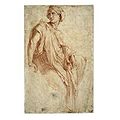
Phrygian Sibyl
Encyclopedia

Sibyl
The word Sibyl comes from the Greek word σίβυλλα sibylla, meaning prophetess. The earliest oracular seeresses known as the sibyls of antiquity, "who admittedly are known only through legend" prophesied at certain holy sites, under the divine influence of a deity, originally— at Delphi and...
s of the Gothic and Renaissance imagination, the Phrygian Sibyl was the priestess presiding over an Apollo
Apollo
Apollo is one of the most important and complex of the Olympian deities in Greek and Roman mythology...
nian oracle
Oracle
In Classical Antiquity, an oracle was a person or agency considered to be a source of wise counsel or prophetic predictions or precognition of the future, inspired by the gods. As such it is a form of divination....
at Phrygia
Phrygia
In antiquity, Phrygia was a kingdom in the west central part of Anatolia, in what is now modern-day Turkey. The Phrygians initially lived in the southern Balkans; according to Herodotus, under the name of Bryges , changing it to Phruges after their final migration to Anatolia, via the...
, a historical kingdom in the west central part of the Anatolia
Anatolia
Anatolia is a geographic and historical term denoting the westernmost protrusion of Asia, comprising the majority of the Republic of Turkey...
n highlands. The Phrygian sibyl appears to be one of a triplicated sibyl, with the Hellespontine Sibyl
Hellespontine Sibyl
thumb|right|Montfoort's rendering of the Hellespontine SibylThe Hellespontine Sibyl was the priestess presiding over the Apollonian oracle at Dardania. The Sibyl is sometimes referred to as the Trojan Sibyl. The word Sibyl comes from the ancient Latin word sibylla, meaning prophetess or oracle...
and the Erythraean Sibyl
Erythraean Sibyl
The Erythraean Sibyl was the prophetess of classical antiquity presiding over the Apollonian oracle at Erythrae, a town in Ionia opposite Chios, which was built by Neleus, the son of Codrus....
. There was indeed an oracular site in Phrygia, but a single one, at Gergitis.
The sibyls of Antiquity
Classical antiquity
Classical antiquity is a broad term for a long period of cultural history centered on the Mediterranean Sea, comprising the interlocking civilizations of ancient Greece and ancient Rome, collectively known as the Greco-Roman world...
were increased to ten in Lactantius
Lactantius
Lucius Caecilius Firmianus Lactantius was an early Christian author who became an advisor to the first Christian Roman emperor, Constantine I, guiding his religious policy as it developed, and tutor to his son.-Biography:...
' Divine Institutions (i.6) a 4th century work quoting from a lost work of Varro
Varro
Varro was a Roman cognomen carried by:*Marcus Terentius Varro, sometimes known as Varro Reatinus, the scholar*Publius Terentius Varro or Varro Atacinus, the poet*Gaius Terentius Varro, the consul defeated at the battle of Cannae...
, (1st century BCE).
The word Sibyl comes (via Latin
Latin
Latin is an Italic language originally spoken in Latium and Ancient Rome. It, along with most European languages, is a descendant of the ancient Proto-Indo-European language. Although it is considered a dead language, a number of scholars and members of the Christian clergy speak it fluently, and...
) from the ancient Greek
Ancient Greek
Ancient Greek is the stage of the Greek language in the periods spanning the times c. 9th–6th centuries BC, , c. 5th–4th centuries BC , and the c. 3rd century BC – 6th century AD of ancient Greece and the ancient world; being predated in the 2nd millennium BC by Mycenaean Greek...
word sibylla, meaning prophet
Prophet
In religion, a prophet, from the Greek word προφήτης profitis meaning "foreteller", is an individual who is claimed to have been contacted by the supernatural or the divine, and serves as an intermediary with humanity, delivering this newfound knowledge from the supernatural entity to other people...
ess. There were several Sibyls in the ancient world, all of whom were re-employed in Christian mythology
Christian mythology
Christian mythology is the body of myths associated with Christianity. In the study of mythology, the term "myth" refers to a traditional story, often one which is regarded as sacred and which explains how the world and its inhabitants came to have their present form.Classicist G.S. Kirk defines a...
, to prefigure Christian eschatology
Christian eschatology
Christian eschatology is a major branch of study within Christian theology. Eschatology, from two Greek words meaning last and study , is the study of the end of things, whether the end of an individual life, the end of the age, or the end of the world...
:
- When the dread trumpet resounds, the deepest earth will yawn open,
- Kings will be set before the throne of God.
- He will deliver the final judgement on the good and the wicked,
- for the latter, fire, for the rest, eternal delights
Such were the lines, based on Tuba mirum and composed by Aria Montano for the portrait of the "Phrygian Sibyl" (1575), one of the suite of ten copperplate engravings of the Sibyls by the Antwerp artist Philip Galle (1537–1612).

